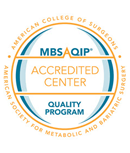The stomach is cut and divided into two sections. The new, smaller stomach is shaped like a long tube. The small intestine is measured down from the stomach, a loop is formed, and the top of the loop is connected to the stomach. This connection of two tubular parts that typically do not attach is called one anastomosis. As a result of the procedure, food no longer passes through the larger portion of the stomach and part of the small intestine.
How the One Anastomosis Gastric Bypass Helps You Lose Weight
The mini gastric bypass is considered a metabolic procedure because it changes how your body processes food. It works in three ways.
- The smaller, newly created stomach holds less food, which means fewer calories are ingested.
- Up to seven feet of the small intestine is bypassed, which results in the digestion of less food.
- The altered food pathway changes the levels of gastrointestinal hormones that decrease hunger, increase fullness, and allow the body to reach and maintain a healthy weight. This often results in the improvement of adult-onset diabetes even before weight loss occurs.
